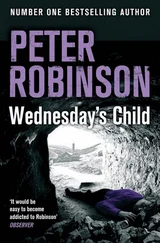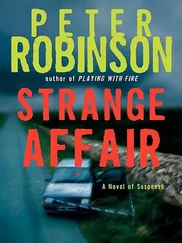“That picture on the door. The woman.”
“I saw it.”
“Dennis called me to see it. It was his idea of a joke. That’s what I mean. Neanderthal.”
“I see. Was the door open? The door to the cellar?”
“No, it was closed. But there was light showing under it, a sort of flickering light.”
“You didn’t hear anyone in there?”
“No.”
“Did either of you call out before you went in, identifying yourselves as police officers?”
“I don’t remember.”
“Okay, Janet. You’re doing fine. Carry on.”
Janet’s knees were pressed tight together and she was twisting her hands on her lap as she spoke. “Like I said, there was this flickering light.”
“The candles.”
Janet looked at him and gave a little shudder. “There was a bad smell, too, like drains.”
“Did you have any reason to be afraid at this point?”
“Not particularly. It was creepy, but we were proceeding cautiously, as we always do in such situations. Routine. He could have been armed. The husband. We were aware of that possibility. But if you mean did we have any inkling of what we’d find in there, then no. If we had, we’d have been out of there like a shot and brought in the troops. Dennis and me, we’re neither of us the hero types.” She shook her head.
“Who went in first?”
“I did. Dennis kicked the door in and stood back, like, you know, making a bow. Taking the piss.”
“What happened next?”
She gave a sharp jerk of her head. “It was all so fast. It was a blur. I remember candles, mirrors, the girl, crude drawings on the walls, things I saw out of the corners of my eyes. But they’re like images from a dream. A nightmare.” Her breathing became sharper and she curled up on the armchair, legs under her, arms wrapped around herself. “Then he came. Dennis was right behind me. I could feel his breath warm on my neck.”
“Where did he come from?”
“I don’t know. Behind. A corner. So fast.”
“What did Dennis do?”
“He didn’t have time to do anything. He must have heard or sensed something to make him turn, and the next thing I knew he was bleeding. He screamed out. That’s when I pulled my baton. He cut Dennis again, and the blood sprayed over me. It was as if he hadn’t noticed me, or he didn’t care, he’d get to me later. But when he did, I had my baton out and he tried to slash me but I deflected it. Then I hit him…” She started to sob and rubbed the backs of her hands against her eyes. “Sorry. Dennis, I’m so sorry.”
“It’s all right,” Banks said. “Take it easy, Janet. You’re doing fine.”
“He had his head on my lap. I was trying to hold the artery closed, like they teach in First Aid. But I couldn’t do it. I’d never done it before, not with anyone real. The blood just kept seeping out. So much blood.” She sniffed and ran the back of her hand across her nose. “Sorry.”
“That’s okay. You’re doing fine, Janet. Before that. Before you tried to save Dennis, what else did you do?”
“I remember handcuffing the man to one of the pipes.”
“How many times did you hit him?”
“I don’t remember.”
“More than once?”
“Yes. He wouldn’t stop coming, so I hit him again.”
“And again?”
“Yes. He kept getting up.” She started sobbing again. When she’d calmed, she asked, “Is he dead?”
“Not yet.”
“The bastard killed Dennis.”
“I know. And when a man’s partner is killed he’s supposed to do something about it, right? If you don’t, it’s bad for business, bad for detectives everywhere.”
Janet looked at him as if he were crazy. “What?”
Banks looked up at Bogart as Sam Spade. Clearly the posters were there for show, not as a result of any great passion for the films themselves, and his pathetic attempt at lightening things up fell flat. “Never mind,” he said. “I was just wondering what went through your mind.”
“Nothing. I didn’t have time to stop and think. He’d cut Dennis and he was going to cut me. Call it self-preservation if you like, but it wasn’t a conscious thought. I mean, I didn’t think I’d better hit him again or he might get up and cut me. It wasn’t like that.”
“What was it like?”
“I told you. A blur. I disabled the killer, handcuffed him to one of the pipes and then I tried to keep Dennis alive. I didn’t even look in Payne’s direction again. To be honest, I didn’t give a damn what shape he was in. Only Dennis.” Janet paused and looked down at her hands clasped around the glass. “You know what really gets me? I’d just been nasty to him. All because he’d been telling his damn sexist jokes to that fireman.”
“What do you mean?”
“We’d been arguing, that’s all. Just before we got to the house. I told him his mole was probably cancerous. It was cruel of me. I know he’s a hypochondriac. Why did I do that? Why am I such a horrible person? Then it was too late. I couldn’t tell him I didn’t mean it.” She cried again and Banks thought it best to let her get it all out. It would take more than one tearful session to purge her of her guilt, but at least it was a start.
“Have you been in touch with the Federation?”
“Not yet.”
“Do it tomorrow. Talk to your rep. They’ll be able to help with counseling, if you want it, and…”
“Legal representation?”
“If it comes to that, yes.”
Janet got to her feet a bit more unsteadily and went to pour herself another drink.
“Are you sure that’s wise?” Banks asked.
Janet poured herself a stiff measure and sat down again. “Tell me what else I should be doing, sir. Should I be going to sit with Dennis’s wife and kids? Should I try to explain to them how it happened, how it was all my fault? Or should I just smash up my flat and go out on the town and pick a fight in some anonymous pub somewhere, the way I feel like doing? I don’t think so. This is by far the least harmful alternative to anything else I’d rather be doing right now.”
Banks realized that she had a point. He had felt that way himself more than once, and had even given in to the urge to go out on the town and pick a fight. It hadn’t helped. He would be a hypocrite if he said he didn’t understand plenty about finding oblivion at the bottom of a bottle. There had been two periods in his life when he had sought solace that way. The first was when he felt he was fast approaching burnout those last few months in London, before the transfer to Eastvale, and the second was more than a year ago, after Sandra had left him.
The thing was, people said it didn’t work, but it did. As a short-term solution, for temporary oblivion, there was nothing to match the bottle, except perhaps heroin, which Banks hadn’t tried. Maybe Janet Taylor was right, and tonight drinking was the best thing she could do. She was hurting, and sometimes you had to do your hurting by yourself. Booze helped dull the pain for a while, and eventually you passed out. The hangover would be painful, but that was for tomorrow.
“Right you are. I’ll let myself out.” On impulse, Banks leaned over and kissed the top of Janet’s head as he left. Her hair tasted of burned plastic and rubber.
That evening, Jenny Fuller sat in her home office, where she kept all the files and notes on the investigation on her computer, no office having been made available to her at Millgarth. The office looked out over The Green, a narrow stretch of parkland between her street and the East Side Estate. She could just see the lights of the houses through the spaces between the dark trees.
Working so closely with Banks had made Jenny remember a lot of their history. She had once tried to seduce him, she recalled with embarrassment, and he had resisted politely, claiming to be a happily married man. But he was attracted to her; she knew that much. He wasn’t a happily married man anymore, but now he had “The Girlfriend,” as Jenny had come to call Annie Cabbot, though she had never met her. That had come about because Jenny had spent so much time out of the country and hadn’t even been around when Banks and Sandra separated. If she had been… well, things might have been different. Instead, she had embarked on a series of disastrous relationships.
Читать дальше












